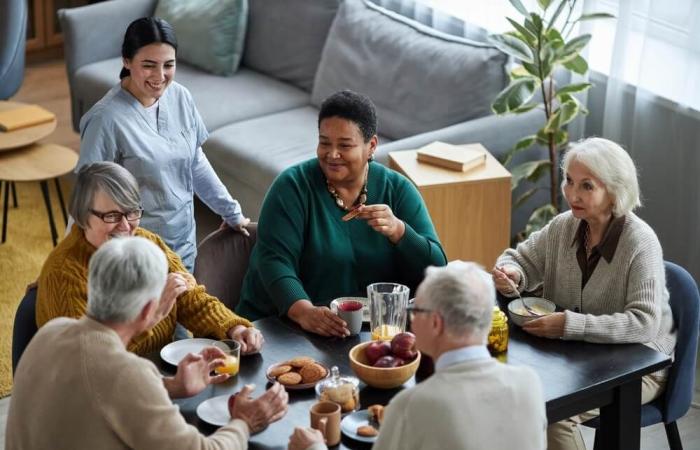It’s no secret: in many retirement homes, the quality of life of elderly people is questioned. The conditions in which our elders age have become a real social issue. And rightly so.
In this context, Heydii chose to highlight two subjects which, as speech therapists, were close to his heart.
The first : isolation. A large majority of older people have a sensory and/or cognitive disorder that hinders communication.
However, it is common to observe that many exchanges are prevented by ignorance or false beliefs.
« He doesn’t talk, he must be depressed. She doesn’t participate, it’s because she’s always had a bad temper ».
Interaction with others is the most important source of cognitive and emotional stimulation. It is important to realize that communicating in an appropriate way is caring.
« When you know everything that’s going on in the brain of someone you’re talking to, you really pay attention to it. », explains Juliette Akari, trainer.
The second: meals. Many residents go wrong and have dental problems.
Here again, certain beliefs die hard: “if we give him mixed food, he will make fewer mistakes, he will be safer, and that takes away my responsibility. The family wants to bring a cake for the birthday, can they? “.
Food is at the heart of many ethical issues, and it is common to overtreat people by adjusting the textures of their meals.
« When we are aware of all the consequences inherent in changing the meals of the elderly, we think twice before taking the easy route. », assures Coralie Marquenier, speech therapist.
In conclusion: talking with a resident, giving them food, cannot be timed tasks to be carried out, without understanding everything that is at stake.
Because these are the last remaining pleasures of a life. Because the time “saved” by not meeting these fundamental needs results in an acceleration of the overall deterioration of the state of health and dependence, and therefore an increase in the need for assistance.
To bring awareness, reflection, into actions with our parents, grandparents, residents, patients, these speech therapists have set up a training organization to address these subjects within EHPADs.
Behind Heydii, three founding speech therapists: Alicia Berteau, Coralie Marquenier and Juliette Akari. All with professional experience working with the elderly and providing neuro-geriatric care.
Thanks to their experience, they have observed to what extent the dynamics of the person and those around them will change everything about aging in good conditions.
They created Heydii to transmit knowledge to professionals and families who deal with fragile aging people on a daily basis: to bring back confidence, support and understanding around these sensitive subjects.
They are keen to make these concepts accessible to all, because these are subjects that we are or will be, directly or indirectly, confronted with.






